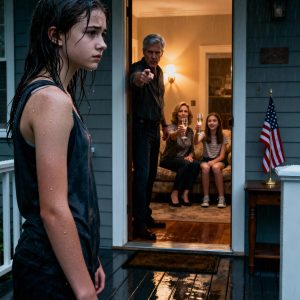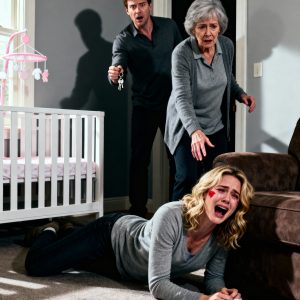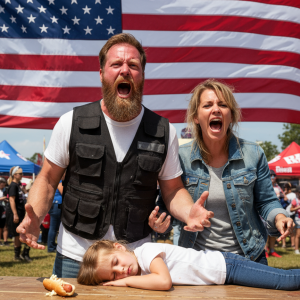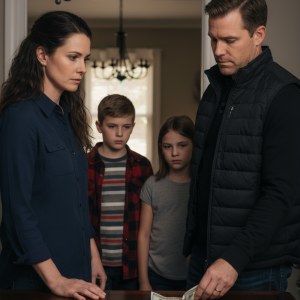The monitor gave up at 3:42 p.m. on an otherwise ordinary Tuesday—no dramatic blip, just a long, flat hum that swallowed the room whole.
I stayed frozen, still cradling Rachel’s now‑cool hand, aware that I was the last heartbeat beside her.
A nurse eased into the doorway, clipboard pressed to her chest, sympathy lining every exhausted feature. “Mrs. Emerson, do you need anything?”
I shook my head, words jammed in my throat. Beyond her, life thrived—families hugging doctors, balloons bobbing over wheelchairs—yet my corner of the world stayed silent.
“I called my husband and his sister again,” I whispered. “They promised they’d come.”
She offered what comfort she could. “Some people can’t face farewells.” We both knew it wasn’t fear; it was choice.
I reached for my phone—three missed calls from work, none from David or Karen. The nurse steadied me into a chair. “Before she passed, Rachel asked me to give you this.” She slipped a worn envelope into my hands, my name scrawled in her spidery script.
Inside lay a small rusted key taped above an unfamiliar address and one stark sentence: They never loved me. Now they’ll learn how it feels to be left.
The nurse noticed my color drain. “Are you all right?”
“Yes,” I lied, folding grief into my pocket.
Forms signed, I gathered Rachel’s meager belongings—a frayed robe, crooked glasses, a half‑read paperback—and stepped into sunshine that felt too bright.
I lingered in the driver’s seat, replaying her final weeks: the guarded glances, the unspoken calculus behind her eyes.
Red‑light pause. No new messages. When David finally called, his first words were about groceries.
“Rachel died today,” I said, knuckles white around the faucet.
Silence, then a shrug you could hear: “She was never easy.”
Sleep found everyone but me. At dawn I keyed the address into my GPS and drove thirty rural miles to a leaning gate guarding a rose‑swallowed cottage.
The key turned like it still belonged. Dust motes drifted through sunlit air, shelves groaned with old books, and on the table waited another envelope marked For my attorney, upon my death.
Inside that quiet, I realized this was Rachel’s true home—the one David had never mentioned. I rang the lawyer named on the envelope.
“Ms. Emerson, we’ve been expecting you,” came the warm reply. “Rachel asked that all beneficiaries attend tomorrow morning.”
That night David watched football while I recounted the nurse, the key, the cottage. He muted the screen only long enough to agree to the meeting.
Morning downtown, Karen flicked ash from a cigarette. “Waste of my time,” she muttered.
Attorney Charlotte Reed unfolded the will:
“To my son, David: my forgiveness, though it was never earned.
To my daughter, Karen: my wedding band—let it remind you vows matter.
To my friends Judith and Marie: $5,000 each for steadfast kindness.
To my daughter‑in‑law, Lauren: everything else.”
Karen erupted; David accused manipulation. Charlotte played Rachel’s video—lucid, resolute, undeniable.
Estate value: roughly $720,000 and the Maple Hollow cottage.
After they stormed out, Charlotte handed me one last note: Forgive no one. Let them kneel. Then walk away.
David’s tone shifted instantly—honeyed concern replaced dismissive shrugs. I packed a weekend bag and left for the cottage.
Among Rachel’s journals I found years of silence recorded in ink: missed holidays, unpaid debts, unanswered calls.
Predictably, Karen filed suit. Rachel had anticipated that too—every debt, every doctor’s exam, every video sealed the case shut.
Judge dismissed; Karen paid costs. David came home drunk, railing at ghosts. I told him I was moving out, attorney to attorney.
Requests for money followed—then threats, then apologies. Each met the same silence Rachel taught me to wield.
Spring thawed grief. I painted the cottage butter‑cream, planted new roses, and hung a wood‑burned sign: Rachel’s Refuge.
With Charlotte’s guidance I founded a nonprofit—support dinners, grief circles, a sanctuary where nobody dies alone.
On what would’ve been Rachel’s 75th, we unveiled a mural of her and her late husband laughing beneath the giant oak; local press ran the story.
I spoke at conferences, wrote The Letter That Freed Me, and rediscovered a life unmarred by quiet cruelty.
David remarried and moved west; Karen slogged night shifts. I never answered another plea.
One calm afternoon, I laid flowers at the oak’s roots. “You were never invisible,” I whispered. “And now, neither am I.”
The breeze stirred—gentle, approving—while the cottage behind me filled with laughter that belonged to the living. Rachel’s true inheritance wasn’t money; it was the resilience to grow something beautiful from the ache she left behind.





